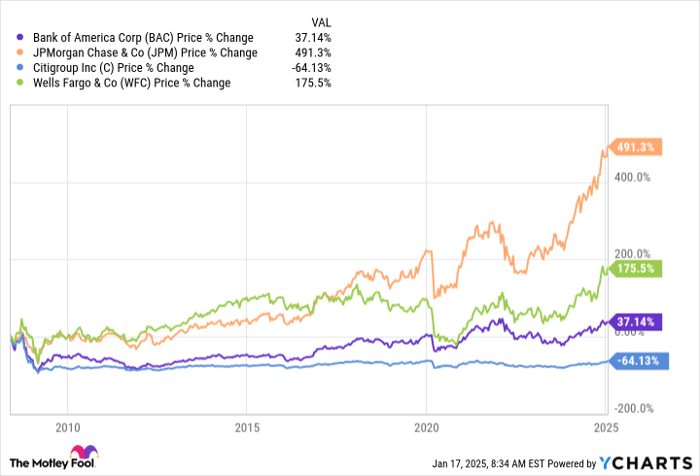Better Warren Buffett Stock: Citigroup Vs. Bank Of America

Warren Buffett and his team at Berkshire Hathaway (NYSE: BRK.A)(NYSE: BRK.B) have long dabbled in bank stocks, owning almost every major Wall Street bank at one time or another over the past several decades. It's an industry Buffett has deep ties to and has done incredibly well with if you think back to Berkshire's timely bank stock investments during the Great Recession.
While Buffett and Berkshire seemingly soured on the sector after the pandemic began (another prescient investing call), Berkshire still owns several bank stocks in its massive $295 billion equities portfolio. Let's examine two of Berkshire's larger bank positions and see which might be the better buy right now for other investors.
Start Your Mornings Smarter! Wake up with Breakfast news in your inbox every market day. Sign Up For Free »
Bank of America: Chasing the king JPMorgan Chase
Berkshire has owned Bank of America (NYSE: BAC) for many years and it's the conglomerate's third-largest equity position, consuming 12% of the overall portfolio. Berkshire sold a large chunk of the stock last year and it's unclear if the selling will continue.
When I think about Bank of America, I tend to think about it as the little brother of the country's largest bank, JPMorgan Chase. Not only is Bank of America the country's second-largest bank by assets, but it's the only other of the Big Four that can boast excellence and scale in so many different banking businesses, including commercial lending, investment banking, wealth management, and credit card lending. Still, its returns aren't quite at the same level as JPMorgan's. Bank of America's return on tangible common equity (ROTCE) has averaged about 13.2% over the last two years, which pales in comparison to JPMorgan's impressive 21.5%. This is a big reason for the valuation gap.
BAC Price to Tangible Book Value data by YCharts
While Bank of America is unlikely to ever catch JPMorgan, it can do better than 13.2% ROTCE. Bank of America has the stickiest consumer deposit base of the Big Four banks and as such benefits from a steepening yield curve, which is finally occurring right now after two years of an inverted yield curve. On the bank's recent earnings call, management guided for the quarterly net interest income run rate to potentially grow by $1 billion through the year, exceeding initial analyst estimates. Loan growth could return this year as well.
More recently, the bank has taken a back seat to Wells Fargo as investors have gotten excited about Wells Fargo soon exiting its asset cap. However, Bank of America should benefit from other tailwinds coming to the sector, including lighter regulation and the return of investment banking activity.
Citigroup: This time seems different
Berkshire took a new stake in Citigroup (NYSE: C) in 2022 and the stock currently makes up 1.5% of Berkshire's portfolio. Citigroup has far and away been the worst-performing large U.S. bank stock since the Great Recession and many investors have ditched the stock out of frustration.
Data by YCharts.
However, the market is starting to believe in CEO Jane Fraser's turnaround plan. Fraser took over as CEO at Citigroup in 2021 and began the difficult task of simplifying Citigroup's complex and sprawling organization. Citigroup is in the process of exiting or selling 14 of its consumer international franchises that it didn't have the scale to compete in. The company is also working to modernize its infrastructure after regulators slapped the bank with infractions for poor internal controls and taking too long to correct those.
Citigroup also announced a plan to exit its consumer, small business, and middle market operations at its highly profitable division in Mexico called Banamex. However, the move has proved long and arduous and encountered many hiccups along the way. After failing to sell the bank, Citigroup split the consumer and small business operations from its institutional business in the country, which it plans to retain. The next step is an eventual IPO. All of these moves are intended to free up capital that Citigroup can use to continue to modernize the bank and invest in its high-returning businesses like investment banking, wealth management, and international money movement.
After reporting strong earnings in the fourth quarter, Citigroup announced the authorization of a $20 billion share repurchase plan, something investors have been chomping at the bit for. As you can see in the first chart above, Citigroup trades below its tangible book value (TBV), or net worth. Repurchasing shares while trading below TBV is accretive to TBV, which bank stocks trade relative to. Growing TBV tends to translate into a growing share price.
Buy $0.88 for $1
I think investors can buy either of these stocks, which will serve them well long term. Bank stocks will never be high-flying artificial intelligence stocks but still deserve some allocation in your portfolio.
Right now, I am making a valuation call and recommending investors buy Citigroup over Bank of America. Buying banks under TBV is where real money can be made in the banking sector if Citigroup can enhance its returns over time (a path the bank appears to be on). If Citigroup can eventually trade at half the valuation of JPMorgan, investors are going to do very well. The bank also carries a 2.8% dividend yield, the highest in its peer group, so investors will be compensated for their time.
Don’t miss this second chance at a potentially lucrative opportunity
Ever feel like you missed the boat in buying the most successful stocks? Then you’ll want to hear this.
On rare occasions, our expert team of analysts issues a “Double Down” stock recommendation for companies that they think are about to pop. If you’re worried you’ve already missed your chance to invest, now is the best time to buy before it’s too late. And the numbers speak for themselves:
- Nvidia: if you invested $1,000 when we doubled down in 2009, you’d have $357,084!*
- Apple: if you invested $1,000 when we doubled down in 2008, you’d have $43,554!*
- Netflix: if you invested $1,000 when we doubled down in 2004, you’d have $462,766!*
Right now, we’re issuing “Double Down” alerts for three incredible companies, and there may not be another chance like this anytime soon.
*Stock Advisor returns as of January 13, 2025
Citigroup is an advertising partner of Motley Fool Money. Bank of America is an advertising partner of Motley Fool Money. JPMorgan Chase is an advertising partner of Motley Fool Money. Wells Fargo is an advertising partner of Motley Fool Money. Bram Berkowitz has positions in Bank of America and Citigroup. The Motley Fool has positions in and recommends Bank of America, Berkshire Hathaway, and JPMorgan Chase. The Motley Fool has a disclosure policy.



